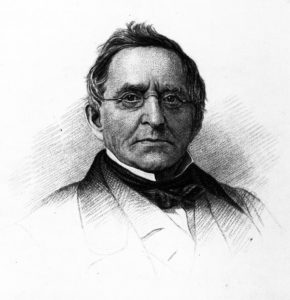
Matthew Vassar is a name that resonates with many in the Hudson Valley. He is recognized primarily for his contributions to the local brewery scene and as the founder of Vassar College. However, his legacy extends far beyond these two notable achievements, reflecting the multifaceted nature of a self-made man who significantly influenced his community.
To understand Matthew Vassar’s impact, placing him in the context of Poughkeepsie during the early to mid-19th century is essential. Contrary to the perception of a quiet, rural town, Poughkeepsie was a vibrant hub of commerce, culture, and politics. The city featured a dynamic social hierarchy, rich with opportunities for influence and engagement among its residents. The local elite played a crucial role in shaping the public and private sectors, fostering a climate ripe for innovation and growth.
Vassar was a savvy businessman and an astute observer of the changing social landscape. He recognized the potential for growth in the brewing industry, tapping into the increasing demand for beer and establishing what would become one of the region’s most successful breweries. His entrepreneurial spirit did not stop at brewing; Vassar was also deeply invested in education and community development.
When he founded Vassar College in 1861, he aimed to provide more excellent educational opportunities, especially for women, which was quite progressive for his time. This institution later grew into one of the leading liberal arts colleges in the United States and has continued to shape the educational landscape for generations.
Matthew Vassar’s legacy is a testament to the indelible mark one individual can leave on both a community and the larger societal fabric. His story is woven into the history of Poughkeepsie, embodying the spirit of ambition and progressiveness that characterized the era in which he lived.
Ad
Ok, back to the facts on this complex man:
- Matthew Vassar was born in East Dereham, Norfolk, England, on April 29, 1792.
- Vassar, Michigan, is named after his cousin, John Ellison Vassar.
- His parents, James and Ann Bennett Vassar, were farmers, brewers, and brick makers of French Huguenot ancestry.
- The original spelling of the family name was Vasseur.
- Young Matthew had typhus fever three times as a youth and was near death several times.
- The family settled on a farm near Manchester Bridge in Dutchess County.
- Contrary to popular belief, Matthew Vassar did not start the family brewing business; his father did. In 1801, James Vassar (Matthew’s father) sold the farm and bought a lot between Main and Mill Streets in the village of Poughkeepsie to build a brewery.
- When Vassar was 14, his parents had him apprentice to a tanner.
- A day before beginning his apprenticeship, he ran away and, crossing the Hudson River on the ferry at High Point, made his way to Balm Town (today’s Balmville), just north of Newburgh, New York. There, he found a job at $300 a year in the store run by Mr. Butterwoth, assisting in the business while living in his employer’s house
- In 1810, he returned to Poughkeepsie and joined the family brewing business as a bookkeeper and collector.
- In 1811, a malt-dust explosion destroyed the family brewery on Vassar Street. His older brother, John Guy, died in the blast. Matthew took over management of the business at the age of 18.
- After his brother’s death, Matthew considered it his responsibility to be responsible for his brother’s two sons, Matthew, Jr., and John Guy, Jr.
- During the War of 1812, Vassar joined the local fusilier’s company as a sergeant but saw no action.
- Vassar opened a saloon and restaurant in the basement of the county courthouse. He lived in a basement room in the county courthouse, under the sheriff’s office.
- In 1812, he bought a patent right for machinery for shearing cloth from Peter Cooper (later founder of Cooper Union) for $300.
- In 1813, Matthew married Catharine Valentine of Fishkill. They lived in a small residence for $40 a year on what is now the corner of Noxon and Academy Streets in the village of Poughkeepsie.
- In 1814, Vassar opened M. Vassar & Company and rebuilt the brewery on Vassar Street across the street from the family townhouse. At the time, it was the largest brewery in the United States.
- In 1823, Matthew became a Fire Company #3 member of Poughkeepsie.
- In 1824, the Dutchess County Colonization Society was formed to ” colonize the free people of color with their consent and choice,” with Matthew Vassar designated its secretary.
- In 1831, Vassar took an active part in the incorporation of the Poughkeepsie Saving Bank.
- In 1832, Matthew Vassar became a shareholder in the Poughkeepsie Whaling Company, where he built a large dock.
- At 27, Vassar was elected trustee of the Village of Poughkeepsie (now the City of Poughkeepsie).
- In 1836, he built a larger brick brewery on the waterfront above the Main Street Landing. The waterfront facility had a brewing capacity of 60,000 barrels annually. Both the malt and the hops were produced locally.
- The brewing company expanded to include two facilities in Poughkeepsie, one in New York City and one in Lansingburgh, near Troy, New York.
- In 1837, he took over the bankrupt brickyard of his brother Charles, which made bricks at what later came to be known as Brickyard Hill on the east side of town.
- In 1840, Vassar’s focus from ale shifted slightly with the return of his step-niece, Lydia Booth, as
successful schoolteacher and proprietor of a girl’s seminary in Virginia. - In the 1840s, the Baptist society built a church on Lafayette Place in Poughkeepsie for $20,000. Vassar donated the land and half of the construction cost.
- In 1842, Vassar developed the Hudson River Railroad, which the river sloop owners vehemently opposed.
- In 1847, Matthew Vassar was named president of the Hudson River Railroad. By 1849, trains were regularly scheduled to travel between New York City and Poughkeepsie in under two hours.
- In the 1850s, Vassar was president of the Poughkeepsie Lyceum of Literature, Science, and the Mechanical Arts.
- In 1855, Poughkeepsie was incorporated as a city; Matthew Vassar became president of the Poughkeepsie Aqueduct and Hydraulic Company. The company aimed to supply Poughkeepsie (and the brewery) with clean water.
- Matthew Vassar was known to donate to causes aiding in abolition.
- For the first board of trustees of Vassar College, Matthew Vassar invited 28 men, half of them Baptist clergy members, to form a board of trustees
- Vassar’s lasting achievement is Vassar College, which opened its doors to women’s education in 1865.
- Matthew Vassar died in his seventy-seventh year on June 23, 1868, while delivering his farewell address to the Vassar College Board of Trustees.
The Sojourner
Share this!
031925

